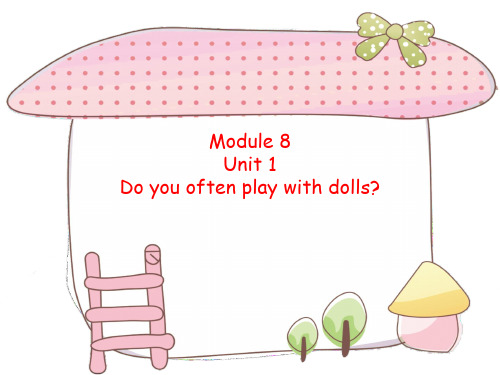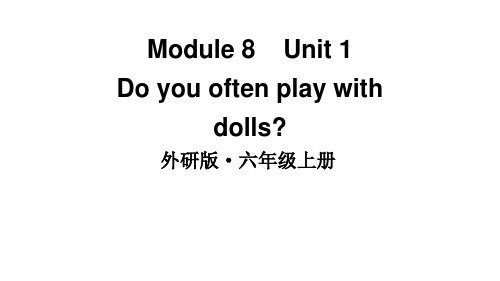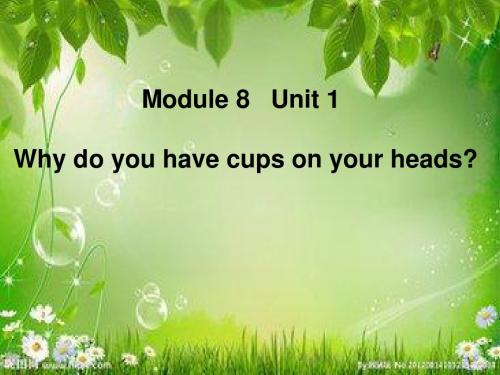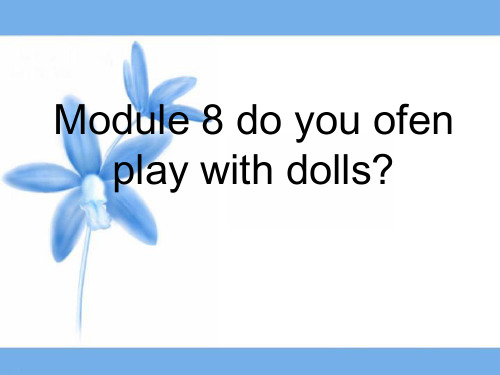外研版小学英语六年级第八册Module1精讲精练
外研版六年级英语上册 Module 8 Unit 1 Do you often play with dolls 课件

(2)play 含义:
含有play的习惯用语: play for time 为争取时间而拖延 play the fool 做傻事 play the game 玩游戏 play it safe 小心翼翼 play it by ear 见机行事 play with fire 玩火;轻举妄动
(3) with 的含义
A. is
B. are
C. be
4. I often _____ my mum on Sunday.
A. helps
B. be
C. help
知识点 1 My grandpa took it long ago. 我爷爷在很久以前拍的。
long ago 的含义及用法
long ago 意为“很久以前”,ago 意为“……以前”, 前面跟一段时间,用于一般过去时。
I’m watching TV now. 我现在正在看电视。
现在进行时态的肯定式、否定式、疑问式及简略回答。 (1)肯定句式:“主语+be+ v.-ing+其他.” (2)否定句式:“主语+be+ not + v.-ing+其他.” (3)一般疑问句句式: “Be+主语+v.-ing+其他?” 肯定答语:“Yes,主语+be.” 否定答语:“No,主语+ be not.” (4)特殊疑问句:“What +be+主语+v.-ing+其他?”
她昨天不在这儿。
动词的过去式分为规则动词和不规则动词两种: ①规则动词的过去式d。 b)以不发音的字母e结尾时,去掉e,加ed (即直接加d)。 ꎬ 例如:like—liked。 c)以辅音字母y结尾时,把y变成i ,再加ed。 例
外研版六年级英语上册上课课件Module 8 Unit 1

➢ 1. My grandpa took it long ago. 2. Yes, I’d love to. 3. You’re playing with dolls. 4. Not really. 5. Did he show you his photos in China? 6. Do you often play with dolls?
Who took this photo?
Lingling’s grandpa took it long ago.
很久以前
1 Look, listen and say.
Amy: Look at this photo. It’s interesting. Who took it?①
Lingling: My grandpa took it long ago.②
stories.
A: Do you often clean your room?
B: Not very often. Do you?
A: Yes, I do.
Game time
Do you often _________?
Yes, of course./ Not very often.
4 Practise.
Watch the video and number.
()
()
()
()
2 Listen, read and act out.
Amy: Do you want to see my photos? Lingling: Yes, I’d love to.③
Amy: Look at this photo.
Amy: Oh, it’s old.
Listen and answer
六年级下册英语说课稿-Module 8 第一课时Unit 1 1~2 外研版

六年级下册英语说课稿-Module 8 第一课时Unit 1 1~2 外研版一、教材分析教材本课程使用的是《外研版英语》六年级下册,Module 8 第一课时 Unit 1 1~2。
教学目标1.学习并掌握 Unit 1 1~2 中所有的单词和短语。
2.能够听懂并理解 Unit 1 1~2 中的对话内容,并根据提示回答问题。
3.能够运用新学过的语言表达简单的日常交际场景。
4.培养学生的听、说、读、写四项能力和积极的合作意识。
教学重难点本节课的重点是教授学生如何用英语进行一些日常交际,如问候、介绍自己等。
难点是如何运用新学过的语言进行表述和理解。
教学准备1.多媒体投影仪及电脑。
2.PPT课件。
3.单词卡片、图片、短语表等。
4.班级文化背景素材。
二、教学过程1. 导入(1)问好并进行热身T: Good morning/afternoon, class. How are you today?S: Good morning/afternoon, teacher. We are fine, thank you.T: Great! Let’s start our class with a fun game. What day is it today?S: Today is …(Monday/Tuesday/Wednesday/Thursday/Friday/Saturday/Sunday).T: Wonderful. Today, we are going to learn some new words and phrases to help us communicate better in English.(2)观察图片T: Look at the following picture, what can you see? Can you tell me what they are?(展示图片,学生进行回答)T: We can see a boy named Peter and a girl named Lucy. They are friends. Do you have friends too?2. 学习新知1) 单词及短语的学习(1)单词学习T: Let’s start with some new words.(展示单词卡片,学生跟读)T: Now let’s practice the pronunciation. Please listen to me and repeat after me.(2)短语学习T: We also have some phrases to learn today. Let’s look at them together.(展示短语表,学生跟读)T: Please pay close attention to the tone and the rhythm of the phra ses. Let’s practice together.2) 对话学习T: Now, let’s listen to a dialogue between Peter and Lucy about introducing themselves to each other.(播放对话音频)T: What did Peter say to introduce himself to Lucy?S: He said:。
最新英语外研版小学六年级下册module8 unit1优质课课件

Homework:
1. 2.运用Why are you ...? I’m ...创设情境编写一段对话。 3、听读课文五遍。(可选做其中两个)
Fill in the blanks:
on your heads? Why do you have cups _____ Why are you________ play Laughing ? They _______to planned a baseball game. Amy asked Lingling to bring caps some________for the game. But Lingling cups brought some_______. Then they put the on laughed cups_____their heads and ________more. put Sam brought baseball ______caps, they _____the caps playground on. Then they went to the__________and played together.
读课文并试着回答下列问题:
1、Why are they laughing ? 2、What did they plan to do ? 3、What did Amy ask Lingling to do ? 4、What did Lingling bring ? 5、What was in Sam’s bag ? 6、What did they do at last(最后)?
came---come had---have told---tell brought---bring put---put said---say were---are went---go
外研版小学英语(新标准三起)六年级上册课件 Module 8 Unit 1 (1)

Long ago A long time ago
I stopped a long time ago. My grandpa took it long ago.
Picture book
Story book
There is a picture book in this photo.
I love picture books.
show
Show sb sth 向某人展示某物
Show you his photos Did he show you his photos in China? Oh yes ,he did.
Read books Do you like reading books now? Yes,of course.I often read stories
Camera Daming has got a good camera.
Take photos 拍照
Do you often take photos? Yes,I love taking photos.
There is a picture book in this photo.
I love story books.
Take photos of me/him/her 给我/他/她 拍照
He often takes photos of me. He also took many photos of Sam and me.
Read stories Play with dolls Clean your rooms Eat fast food
Watch films Play football
Ride a bike
Swim
Speak English源自Help your mum
外研版小学英语六年级上册 Module 8 Unit 1 名师教学课件

Listen again and answer.
1. Does Amy often play with dolls? Not really. She stopped a long time ago.
2. Does Amy like reading books now? Yes, of course. She often reads stories.
Amy: Not really. I stopped a long time ago. Amy: There’s a picture book in this photo. I loved picture books. Lingling: Do you like reading books now? Amy: Yes, of course. I often read stories.
Read and find the new words and sentences
Listen and read after it.
Amy: Do you want to see my photos? Lingling: Yes, I’d love to.
Amy: Look at this photo. Lingling: You’re playing with dolls. Do you often play with dolls?
Yes, 主语 + do/does. /No, 主语 + don’t/ doesn’t. 例 -Do you often watch TV? -No, I don’t. 例 -Does he often call his parents? -Yes, he does.
-Did he show you his photos in China? –Oh yes, he did.
外研社版三起英语六年级下册Module8 Unit1 课件
What is Sam looking for? He is looking for __h_is__b_a_g__. Where’s the bag? ___I_t_’s__u_n_d__e_r_h_i_s_b__e_d_.______
询问原因及回答。
crying----sad
Why is he crying?
Why are you laughing? Because ___I'_m__h_a_p_p__y__.
cry
sad
shout angry
eat
hungry
crying I’m sad.
Why are you shouting? Because I’m angry.
Why are you eating? Because I’m hungry.
he said. “I make lots of mistakes with Chinese words too.
Now look what’s in my bag!” Sam opened his bag. There
were baseball caps! “Hooray!” everyone shouted. They put
Because he is sad.
sleeping-----tired
Why is she sleeping?
Because she is tired.
running---afraid
Why is he running?
Because he is afraid.
Can you guess?
laugh happy
the caps on. Then they went to the playground and played
外研版(一起)六年级英语上册Module 8 Unit 1《Do you often tidy your bed》课件
read books
listen to muቤተ መጻሕፍቲ ባይዱic
自主或小组探究
活动探究 Watch and understand
Read and answer!
Does Amy often tidy her room? Yes, she does. Does she often tidy her desk? No,she doesn’t. What does Amy do every day? She reads stories every day.
谢谢!
个人探究 Let’s speak!
Do you often tidy your bed? Yes, I do.
Let’s speak!
X
Do you often sweep the floor? No, I don’t.
Let’s speak!
Do you often read stories? Yes, I do.
总结提高
1.often 意义:经常 I often write letters. 2.tidy 意义:adj.整洁的
v. 整理 I want to tidy my bedroom.
--Does he often wash his hands? -- __B____ . A. Yes, he do. B. Yes, he does. C. No, he don’t.
Lingling: Do you often tidy your bed? Amy: Yes, every day. I can sleep well in a tidy bed. Lingling: I know. Do you often tidy your desk? Amy: No, I don’t. It’s very messy. I can’t find my books. Lingling: I will help you, Amy. I will tidy your desk. Amy: Thank you.
小学英语新外研版(一起)六年级上册新标准Module 8 Unit1.习题第一课时
小学英语新外研版(一起)六年级上册
Unit1 《Do you often tidy your bed?》习题
第一课时
一、基础题
将短语的意思填入与其相对应的括号内.
1. tidy ( )
2. often ( )
3. messy ( )
A.常常
B. 凌乱的
C. 清整
二、综合题
将下面单词的字母序号填在与其相对应的横线上。
(使用‘学乐师生’App.录音,录下下面的重点句型,并把它们背诵下来!记得在日常生活中经常使用哦!记得和全班同学一起分享!)
1. I’m _____(在清理)Tom’s bed.
2. Does he ____ tidy his bed?.(曾经).
3. It’s very ____(凌乱的).
A. messy
B. ever
C. tidying
三、提高题
单项选择。
()1. ____he ever tidy his bed?
A.Does
B. Can
C. Do
()2.Do you often tidy your desk? No, I ____.
A.doesn’t
B. don’t
C. can’t
()3.Let ___ help you. (我)
A.me
B. my
C. mine
参考答案
一、基础题
1. C
2. A
3. B
二、综合题
1. C
2. B
3. A
三、提高题
1. A
2. B
3.A。
外研版(三起点)小学六年级英语上册Module8_Unit1_优课课件
Talk about these photos
A: Look at this photo, I’m
.
I often . Do you often
?
B: Yes , I do./ No , I don’t. /Not really./Not very often.
①
②
③
④
My Sundays
I often read books and ride my bike in the morning. I like reading books and riding my bike very much. I often go swimming and fly kites in the afternoon. I can swim very well . What do you often do on Sundays?
I love taking photos. camera
Do you often take photos? Yes , I do.
No , I don’t.
Do you want to see my photos? I would
Yes, I’d love to.
我很乐意。
My friend took many photos of me.
外研版(三起点)六年级上册
Module 8 Unit 1
Do you often play with dolls?
prrpielstedaarapyaweykedetcfaesaflaobyfodwtamkpcoikishkpmtEoitbutoeokeTfntatiesorlsogVmlrioleslgidsahmes
Yes, I do.
- 1、下载文档前请自行甄别文档内容的完整性,平台不提供额外的编辑、内容补充、找答案等附加服务。
- 2、"仅部分预览"的文档,不可在线预览部分如存在完整性等问题,可反馈申请退款(可完整预览的文档不适用该条件!)。
- 3、如文档侵犯您的权益,请联系客服反馈,我们会尽快为您处理(人工客服工作时间:9:00-18:30)。
外研版小学英语六年级第八册Module1精讲精练M1 知识点1.What do you want? 你想要点什么?⑴“What”特殊疑问词,对事或物进行提问。
⑵“want”的用法,“want”可以直接加名词,也可以接动词。
⑶“want to do sth.” 意为“想要做某事”,want to eat想要吃,want to drink想要喝2.Is it really a dog? 它真的是一条狗吗?⑴原句= Is hot dog really a dog?⑵Is i t…? Yes, it is. No, it isn‟t.3.It looks good!它看起来很好!⑴“it”是单三形式,动词用单数形式。
look(单数形式) looks.⑵“it” 指代热狗,原句= The hot dog looks good.4.Can I help you? 我能帮助你吗?⑴同义句:What can I do for you? 我能为你做点什么?⑵ can+动词原形5. And to drink?喝点什么呢?还可以说:And what do you want to drink?你们想喝点什么?6. That’s two hamburgers, a hot dog and three colas.一共是两个汉堡,一个热狗和三杯可乐。
此处把点的餐看作一个整体,所以用“That‟s”7. How much is it? 多少钱?⑴“money金钱”不可数名词,应用“how much”来提问。
How much +is +单数名词+…?How much is the hot dog? How much +are +复数名词+…?How much are the hamburgers?⑵ How many+可数名词复数How many apples do you want? How much+不可数名词How much juice do you want?8. It’s thirteen dollars and twenty-five cents.十三美元二十五美分。
dollars和cents 用复数。
9. It’s ten yuan. 十元钱。
yuan元, jiao角, fen分, 没有复数形式,后面都不加s. 询问物品数量……多少钱10. food(食物):hot dog 热狗hamburger汉堡,chicken鸡肉,fish鱼,noodles 面条,rice米饭,vegetable蔬菜,sandwich三明治,biscuit饼干,egg鸡蛋,ice cream冰激凌,pear梨,orange橘子,apple苹果,banana香蕉,watermelon西瓜11. drinks(饮料):orange juice橙汁,milk牛奶,cola可乐,tea茶,water 水一般现在时一、一般现在时的功能1.表示事物或人物的特征、状态。
如:The sky is blue.天空是蓝色的。
They are workers.2.表示经常性或习惯性的动作。
常和often usually always sometimes以及every day(year,month,week……)等短语连用。
如:I get up at six every day.我每天六点起床。
Daming often goes to school at senven .大明常常七点去上学。
3.表示客观现实(真理)。
如:The earth goes around the sun.地球绕着太阳转。
The earth is round.地球是圆的。
二、一般现在时的构成1. be动词(连系动词):主语+be(am, is, are)+其它。
如:I am a boy. 我是一个男孩。
2. 行为动词:主语+行为动词(+其它)。
如:We study English. 我们学习英语。
当主语为第三人称单数(he, she, it)时,要在动词后加"-s"或"-es"。
如:Mary likes Chinese.玛丽喜欢汉语。
三、一般现在时的句型变化(一). be动词(连系动词)的变化。
1、肯定句:主语+ be +其它。
如:we are students.我们是学生。
2、否定句:主语+ be + not +其它。
如:He is not a worker.他不是工人。
3、一般疑问句:Be +主语+其它。
如:-Are you a student?-Yes. I am. / No, I'm not.4、特殊疑问句:(1)疑问词作主语:疑问词+be+……?He is a worker. Who is a worker?(2)疑问词不作主语:疑问词+be+主语+……(一般疑问句语序)?如:My bike is under the tree.Where is your bike?(二). 行为动词的变化。
1、肯定句:主语+行为动词(动词原形,或单三形式)+其它。
如:I like this book. She likes this book.2、否定句:主语+ don't( doesn't ) +动词原形(+其它)。
如:I don't like bread.当主语为第三人称单数时,要用doesn't构成否定句。
如:He doesn't often play.3、一般疑问句:Do( Does ) +主语+动词原形+其它?如:- Do you often play football?- Yes, I do. / No, I don't.当主语为第三人称单数时,要用does构成一般疑问句。
如:- Does she go to work by bike?- Yes, she does. / No, she doesn't.4、特殊疑问句:(1)疑问词作主语:疑问词+动词原形或动词单三形式+其他(陈述句语序)?如:she goes to work by bike.Who goes to work by bike?(2)疑问词不作主语:疑问词+ do( does ) +主语+动词原形+其它(一般疑问句语序)?如:she goes to work by bike.How does your father go to work?四、动词单三形式(动词+s)的变化规则1.一般情况下,直接加-s,如:cook-cooks, milk-milks2.以s. x. sh. ch.或有些以o结尾的,加-es,如:guess-guesses, wash-washes, watch-watches, go-goes3.以“辅音字母+y”结尾,变y为i, 再加-es,如:study-studies以“元音字母+y”结尾,直接加s,如:play-plays五、一般现在时动词时态口诀一般现在时,单三-s/es,其他无变化学好一般现在时,基本用法要牢记一般现在时,经常发生事客观和真理,还表将来时谓语若是实义动,形式要由主语定三单人称做主语,动词后加s/es句中若把助词用,谓语动词用原形六、一般现在时用法专练:一、写出下列动词的第三人称单数drink ________ go _______ stay ________ make ________look _________ have_______ pass_______ carry ____come________ watch______ plant_______ fly ________study_______ brush________ do_________ teach_______二、用括号内动词的适当形式填空。
1. He often ________(have) dinner at home.2. Daniel and Tommy _______(be) in Class One.3. We _______(not watch) TV on Monday.4. Nick _______(not go) to the zoo on Sunday.5. ______ they ________(like) the World Cup?6. What _______they often _______(do) on Saturdays?7. _______ your parents _______(read) newspapers every day?8. The girl _______(teach) us English on Sundays.9. She and I ________(take) a walk together every evening.10. There ________(be) some water in the bottle.11. Mike _______(like) cooking.12. They _______(have) the same hobby.13. My aunt _______(look) after her baby carefully.14. You always _______(do) your homework well.15. I _______(be) ill. I‟m staying in bed.16. She _______(go) to school from Monday to Friday.17. Liu Tao _______(do) not like PE.18. The child often _______(watch) TV in the evening.19. Su Hai and Su Yang _______(have) eight lessons this term.20. What day _______(be) it today?-It‟s Saturday.三、按照要求改写句子1. Daniel watches TV every evening.(改为否定句)___________________________________________________2. I do my homework every day.(改为一般疑问句,作否定回答)________________________________________________________ 3. She likes milk.(改为一般疑问句,作肯定回答)______________________________________________________ 4. Amy likes playing computer games.(改为一般疑问句,作否定回答) ___________________________________________________5. We go to school every morning.(改为否定句)_______________________________________________________ 6. He speaks English very well.(改为否定句)___________________________________________________7. I often like taking photos in the park.(对划线部分提问)________________________________________________________ 8. John comes from Canada.(对划线部分提问)___________________________________________________9. She is always a good student.(改为一般疑问句,作否定回答)________________________________________________________ 10. Simon and Daniel like going skating.(改为否定句)___________________________________________________五、改错(划出错误的地方,将正确的写在横线上)1. Is your brother speak English? __________________2. Does he likes going fishing? __________________3. He likes play games after class. __________________4. Mr. Wu teachs us English. __________________5. She don‟t do her homework on Sundays. _________________6、Does Simon his homework every evening?7、Is your mother go to work every day?8、Look!They have a picnic now.六、根据汉语补充完整英语句子1、he always (做)his homework every day? ,he .(不)2、We (不想吃些) noodles .3、you often (下棋)?,.(是)4、When they (上学)?At senven every day.5、The weather (多云)today.七、改句子1、Nancy doesn…t run fast 肯定句2、I usually play football on Friday afternoon.否定句3、I watch TV every day. 改为一般疑问句4、She lives in a small town near New York. 改为一般疑问句5、Gao Shan…s sister likes pl aying table tennis 改为否定句新标准英语六年级英语下册M1测试卷一.翻译下列单词。
